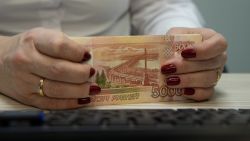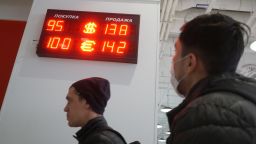Sanctions leveled on Russia have pushed the country toward becoming a closed economy, a status the country is ill-equipped to handle, a senior Treasury official said on Friday.
“The economic consequences Russia is facing are severe: high inflation that will only get higher, and deep recession that will only get deeper,” the official told reporters during a conference call.
Among other steps, Western powers have frozen about half of Russia’s foreign reserves, banned certain Russian banks from the high security SWIFT banking network and blocked exports of key technology to Russia. The United States has also prohibited the import of Russian oil, natural gas and petroleum products.
The goal of the sanctions is to debilitate Russia’s economy to the point that it weakens the country’s ability to use its military, the senior Treasury official said.
“Russia has been backed into a corner to becoming a closed economy, and Russia is in fact one of the most ill equipped countries to do well as a closed economy,” the senior Treasury official said.
The official predicted Russia will have a lot of trouble being isolated on the world stage because it has long relied on the sale of raw materials to buy consumer goods and sophisticated equipment for production.
Of course, there are risks that sanctions worsen the supply chain crisis that has sent inflation in the United States to levels unseen in 40 years.
US officials are keeping an eye on US and European supply chains, including the supply of key metals and minerals required in critical manufacturing processes, the senior Treasury official said.
Likewise, Western powers have granted humanitarian exceptions designed to limit the impact on food prices, which were already high before this crisis began.
The senior Treasury official left the door open to further tightening sanctions against Russia if these supply disruptions are minimized.
Western powers have also granted a license that allowed Russia to make $117 million in interest payments on its debt last month, avoiding a widely feared default.
The goal of that license is to mitigate the impact that a default would have on Western banks, bondholders and other creditors, the senior Treasury official said.
The license expires on May 25 and the senior Treasury official said a decision has not been made on whether or not to extend it.
Ruble’s artificial recovery masks Russian economic devastation
Russia’s economy is getting devastated by Western sanctions and the ruble’s swift recovery has only been made possible by Moscow’s efforts to prop the currency up, the senior Treasury official said.
The comments come after some argued the rapid recovery of the ruble from its initial crash is a sign that Western sanctions have not gone far enough to punish Russia for its invasion of Ukraine.
The senior Treasury official said Russia’s economy is plunging into recession and getting crushed by crippling inflation.
Although the ruble has bounced back to pre-invasion levels, the Treasury official argued the currency’s purchasing power has been decimated by skyrocketing prices in Russia.
As CNN has previously reported, officials in Russia have sought to prop the ruble up, in part by ordering exporters to swap 80% of their foreign currency revenue for rubles, banning Russian brokers from selling securities, forbidding Russian residents from making bank transfers outside of Russia and other steps. The steps have artificially boosted demand for the ruble.
In a sign of the ruble’s underlying weakness, a black market has emerged in recent weeks for the exchange of the ruble for foreign currency, the senior Treasury official said, adding that the ruble is significantly depreciated in this black market.

























